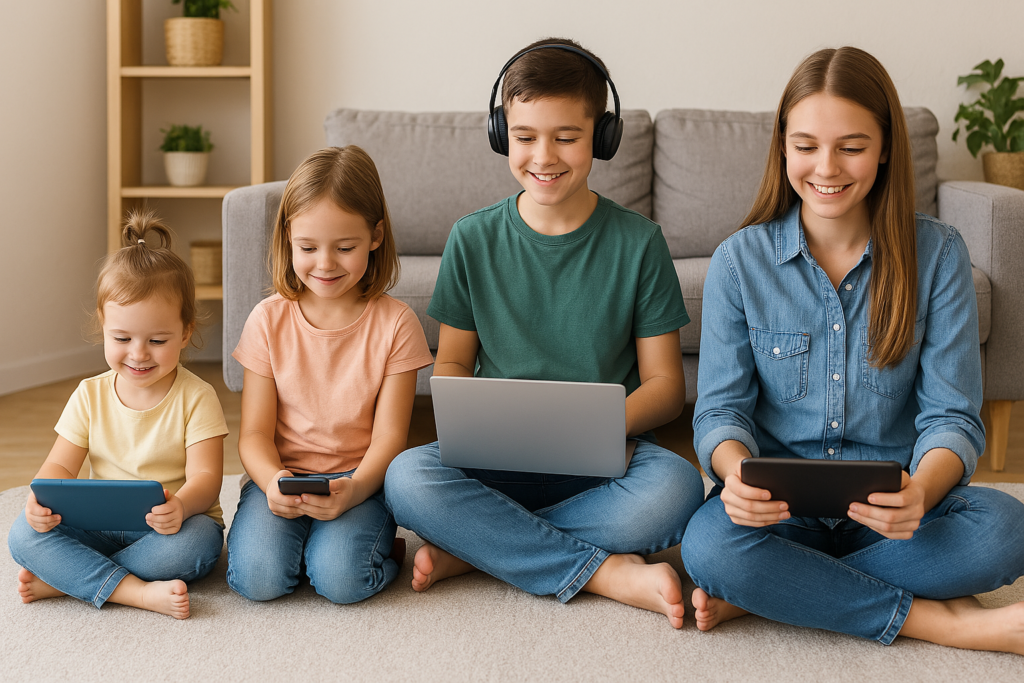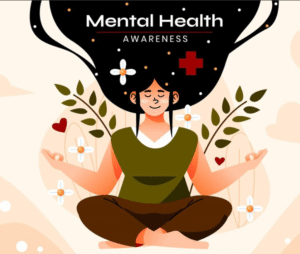Managing screen time by age is now a key concern for parents navigating the digital world. With tablets, TVs, smartphones, and computers woven into daily life, it’s crucial to understand how much is too much — and how to create healthy digital habits tailored to your child’s development stage.
Why Is Screen Time Management Important?
Too much screen time can impact children’s mental health, physical activity levels, and sleep quality. The key lies in age-appropriate limits and meaningful screen engagement — not just how long, but how and why they’re using screens.
Screen Time Recommendations by Age
The American Academy of Pediatrics (AAP) provides science-backed guidelines for daily screen usage based on a child’s age. Below, we break it down and offer practical suggestions to help families maintain balance.
📱 Infants (0–18 months)
Recommended screen time: Avoid screens entirely, except for video chatting.
- Focus on real-world interactions and sensory play.
- Screen exposure at this age may disrupt brain development.
Related Keywords: screen use in infants, digital exposure newborns, no screen time babies
🧸 Toddlers (18–24 months)
Recommended screen time: Introduce screens sparingly and only with adult interaction.
- Choose high-quality, age-appropriate educational content.
- Always co-watch and discuss what they’re seeing.
Related Terms: toddler screen habits, early childhood screen time, screen time guidelines for toddlers
🚼 Preschoolers (2–5 years)
Recommended screen time: Limit to 1 hour per day of high-quality programming.
- Co-view when possible and connect screen time to offline experiences.
- Prioritize active play, social interaction, and sleep.
Related Keywords: preschool screen exposure, TV time preschoolers, safe screen time for kids
🧒 Children (6–12 years)
Recommended screen time: Consistent limits — around 1–2 hours/day for recreational use.
- Encourage creative tech use like coding, storytelling, and digital art.
- Screen-free zones (like during meals or before bed) help reinforce balance.
Related Keywords: screen limits for school-age kids, managing kids’ digital habits, healthy screen time routines
🧑🎓 Teens (13–18 years)
Recommended screen time: Focus on healthy balance, not just numbers.
- Prioritize screen time that supports learning, hobbies, and social connection.
- Teach self-regulation and digital literacy to foster responsibility.
Related Terms: teenage screen addiction, digital detox for teens, mindful media use in adolescence
Tips for Building Healthy Screen Habits
- ✅ Establish tech-free times and zones
- ✅ Encourage outdoor play and hobbies
- ✅ Model healthy screen behavior
- ✅ Use parental controls with transparency
- ✅ Talk openly about online safety and digital citizenship
Want more support? Join our parenting community at Chloe Community for real tips from real families.
What Types of Screen Time Are Beneficial?
Not all screen time is created equal. Distinguish between:
- Passive consumption (e.g., watching videos)
- Interactive use (e.g., educational games)
- Communication (e.g., video chats)
- Content creation (e.g., coding, drawing)
The goal? Promote purposeful engagement over mindless scrolling.
Let’s Stay Connected 👇
Follow Chloe and join the digital wellness conversation:
- 💬 Instagram – ABC With Chloe
- 💬 Facebook – Chloe Community
- 🌐 Chloe Life Companies
- 🌐 Rosell Studios LLC
Final Thoughts
Finding the right screen time by age is about balance, not banning. Technology can empower children — when used mindfully. Start with age-appropriate limits, model good behavior, and use tech as a tool, not a babysitter.
➡️ Ready to reset your family’s screen habits? Explore more tips at Chloe Community.
Frequently Asked Questions
1. What happens if a child has too much screen time?
Excessive screen time can lead to poor sleep, behavioral issues, and reduced academic performance.
2. Can screen time ever be educational for young children?
Yes — when it’s interactive, age-appropriate, and co-viewed with an adult, screen time can support learning.
3. How do I reduce my child’s screen time without causing tantrums?
Gradually introduce engaging offline activities and use positive reinforcement rather than punishment.
4. Is screen time before bed harmful for teens?
Yes. Blue light exposure before sleep can disrupt melatonin production and harm sleep quality.




